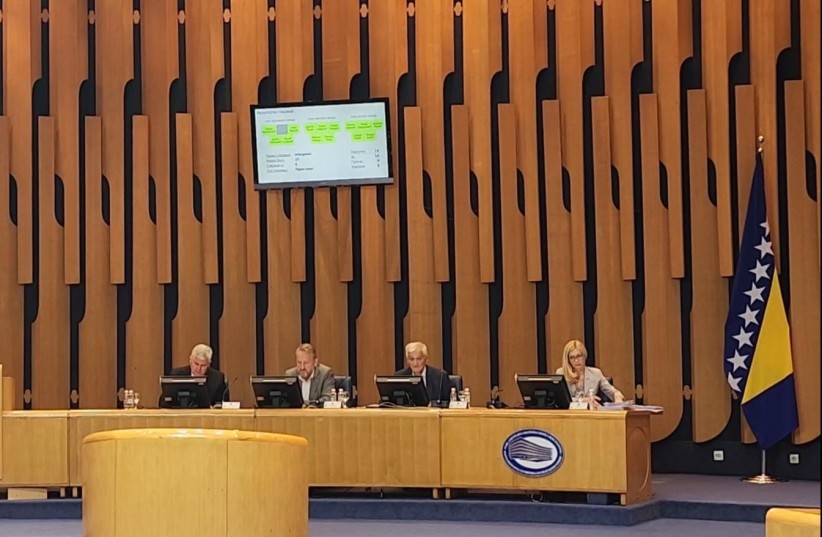Sixty-one percent: That’s the rise in antisemitic attacks in the United States according to a recent study by the ADL, the highest number on record since 1979. Meantime in Europe, about one in four Europeans polled harbor pernicious and pervasive attitudes toward Jews. With antisemitism seemingly surging unabated, we must all stand up against this tide of hatred and the first logical step is to be able to identify when an antisemitic incident has occurred so that we can accurately shine a light on those who perpetuate this cycle of darkness.
The International Holocaust Remembrance Alliance Working Definition of antisemitism (IHRA Working Definition) does exactly that, providing a tool to identify whether or not an attack can be labeled as antisemitic. It was adopted in May 2016 and has since been endorsed by 37 countries, as well as hundreds of other local governments, universities and civil society institutions worldwide.
Yet, despite the dire need for it, the IHRA Working Definition has recently come under prominent attack from UN Special Rapporteur on the Situation of Human Rights in the Palestinian Territories Francesca Albanese and Hollywood actor Mark Ruffalo, via their social media platforms. While both have a long-standing hostility against Israel and a history of ignoring Palestinian terror attacks, such as the one in Ariel this past week, which claimed the lives of three Israelis, it is their assault on the IHRA Working Definition, which is heard around the world and must be countered.
The claims against the IHRA Working Definition are varied, ranging from arguing that it censors free speech, or prevents criticism of Israel, to saying that it provides special treatment for Jews. Antagonists promote other definitions that they assert are more relevant, or the cherry on top, claim that anti-Zionism is not antisemitism.
The lines between free speech and incitement seem to be clear when it comes to other forms of hatred, and yet appear difficult for some people to understand when it comes to antisemitism. So, the IHRA Working Definition attempts to draw those lines. It doesn’t aim to stifle free speech, nor does it prevent criticism of the State of Israel. All it does is draw lines in the sand regarding antisemitism, and when criticism of Israel crosses that line.

An easy, but false claim
THAT THE IHRA Working Definition prevents criticism of Israel is an easy claim to make, but it’s simply false. “Criticism of Israel similar to that leveled against any other country cannot be regarded as antisemitic,” are the words written in plain and simple language in the IHRA Working Definition.
Criticism is normal and encouraged; however, there is legitimate criticism and then there is antisemitism. Some of the contemporary examples of antisemitism hiding as anti-Zionism include denying the Jewish people’s right to self-determination or using classic antisemitic imagery when talking about Israel. Denying the Jewish people’s right to self-determination is one of the examples of clear antisemitism given in the IHRA Working Definition and the point where the line is crossed from legitimate criticism to antisemitism.
Nor does the IHRA Working Definition provide special treatment to Jews. The goal is simply to help identify antisemitism, plain and simple. Identifying hatred against one group does not harm or negate another one’s rights.
Then there are some that propose alternatives to the IHRA Working Definition. One of the main similarities in all of these alternative definitions is that they seek to remove Israel from the discussion. One cannot discuss modern antisemitism without including the State of Israel, the Jewish homeland. Thus, rhetoric and actions that reject Israel’s right to exist are also clear antisemitism.
These alternative definitions all seem to try and point to one statement: that anti-Zionism is not antisemitism. In many cases, the word “Jew” is replaced with “Zionist” or “Israel” in order to hide blatant antisemitism. The IHRA Working Definition merely calls this out. Israel is the home of the Jewish people. We have historic, cultural and religious ties to this land that go back millennia. The definition of the word Zionist means that you support the Jewish people’s right to self-determination in their ancestral homeland, and denying them this right, is antisemitic.
Today, Jews worldwide are being attacked and find themselves the targets of exclusion, marginalization, harassment, and even real or perceived violence based on their identification with Israel and Zionism.
The IHRA Working Definition serves as an invaluable resource to identify antisemitism in all its forms, creating a tool that will become all the more necessary, as global antisemitism continues to surge. As we must all stand against antisemitism and hatred, so too must we encourage education and adoption of the IHRA Working Definition and defend it against its detractors.
The writer is the project manager at the International Legal Forum, an Israel-based network of over 4,000 lawyers and activists around the world, standing up for Israel and combating antisemitism in the international legal arena. Asher has a BA in Government, Strategy and Diplomacy from the IDC and an MA in International Relations from the Hebrew University.
